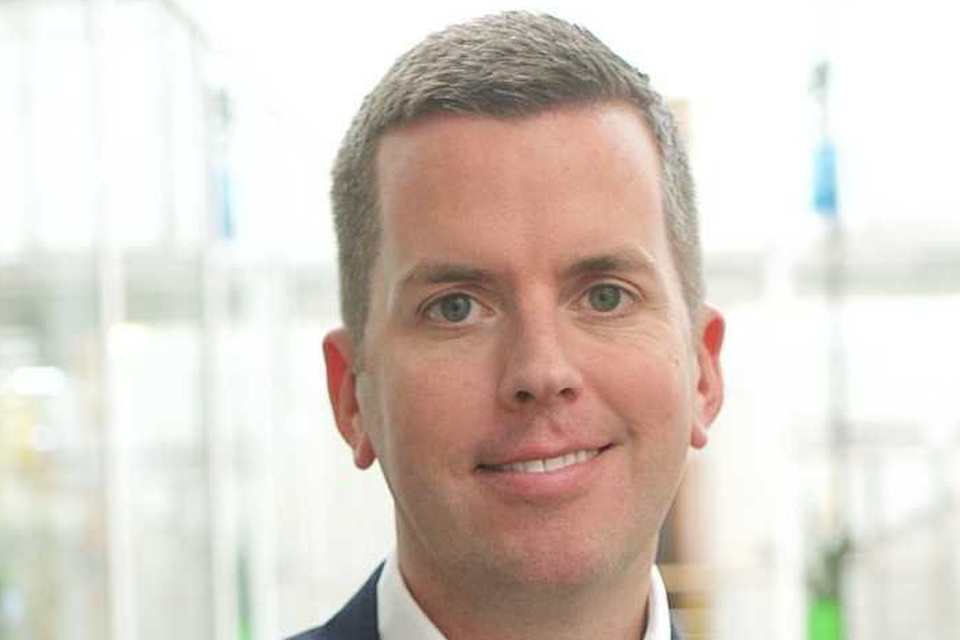'The rise of artificial intelligence and machines won't cost human jobs - it will create new ones'
Rapid advances in technology will not end the need for firms to operate at a human level the SAP chief tells Louise Kelly
Brian Duffy, SAP’s EMEA North president who leads a team of 13,000 staff, says he was always keen on a sales leadership role
Policymakers are starting to fret about the rise of ever-more advanced machines and artificial intelligence (AI), particularly the threat to the livelihoods of millions of workers.
Wexford man Brian Duffy, who heads up technology giant SAP's businesses in Northern Europe doesn't buy it.
"There is a fear on some sides that it will be detrimental, that [AI/machine learning] will take jobs out of the workforce, but it will actually be creating jobs," he said, citing evidence from a recent study by Gartner.
That research report, released at the end of last year, found that while a number of industries will be worse hit than others - namely manufacturing - new jobs will end up being created across the board that didn't exist before.
"With this new technology, it's becoming more apparent how people's skills can be maximised, not that their jobs are simply gone. With AI doing the more routine tasks, staff can focus on more intuitive and strategic roles," said Duffy.
Duffy reckons Ireland, which has enthusiastically embraced the tech sector from an industrial policy perspective, is particularly well poised to benefit.
"The big role that Ireland is playing in fuelling the digital transformation for all of our customers is incredible," he says. "We see the role of AI and machine learning rapidly growing, and in turn, this is increasing the numbers being hired in this pace. We're seeing demand for support from customers who are interested but they don't know what can actually be done," Duffy said.
The industry reception to exponential advances in technology has been mixed, but according to Duffy, the revolution can't be ignored.
After originally joining SAP's legal team 13 years ago, Duffy has worked across the US, Japan and China. He moved to the group's Global Customer Operations as chief of staff to Robert Enslin, a member of the executive board, SAP SE, and Cloud Business Group president. Now, as SAP EMEA North President, Duffy leads a team of around 13,000 employees in the region, from all of the business lines associated with the customer side of the business, from HR through to procurement. Acknowledging the job transition might seem "strange", he said the career "flip" allows him to look at the customer holistically.
"I've always wanted to move into a sales leadership role, being in the field and I'm enjoying it. It's exciting to run this part of the world - that is booming."
Cross-border businesses in Europe mean the new GDPR data privacy regulation that is due to come into force later this month is a particular focus.
With 46 years' of experience in supporting customers and protecting their data, Duffy believes that SAP's task is to identify the challenges thrown up for the group's customers - and helping them accordingly.
"What's interesting now is how customers can take the data they currently have, have had for a long time and are still acquiring. And how they can use that data to fuel change.
"Customers are looking at their buying patterns and adjusting their go-to market offerings and their services as and when need them. It's about creating the holistic view, finding out who their customers are. The world is changing very quickly; it's not about cheap, it's about purchasing the experience."
After taking up his current job last September, Duffy is now London-based. It's closer to home than he has been in over a decade. "We moved to Bellewstown in Meath when I was a child and I went to secondary school in Drogheda, and UCD for college. In my third year, I took part in an exchange programme to the US and got a taste for Chicago.
"So the day after I finished my final exam, I went back to the US; a fact which I am constantly reminded about."
Despite, or perhaps because of, the various places he has called "home" over the last 10 years, Duffy believes a sense of community is vital for what he calls "purposeful performance" in the workplace.
Without purpose, a long-term sustainable business strategy is simply impossible, he said.
"But, if you try and find a common view of what purpose is, you'd think it can only be found in a medical camp in Africa, running an Iron Man or halfway up a mountain. Not always - I found mine much closer to home. When people hone in on their own purpose by analysing their personal data they can help pinpoint where they can get meaningful value from their day-to-day work."
According to Duffy, people's social media data footprint - particularly photos and videos - is essential to this. It's an unusually positive approach at a time when much of the wider mood towards social media platforms is darkening.
"People tend to document the moments that they most enjoy, are most valuable and that they want to share with people. "With that in mind, you don't need to look much further than your own social channels to find, or better understand, what gives you a sense of purpose or what inspires you 'to do good'," he says.
Motivating positive change in the workplace, and a drive for diversity, have become a particular focus of SAP. In the Irish business 34pc of staff are women. The share of women managers is only slightly lower at 33pc. There are also over 60 different nationalities on the workforce.
But SAP's Autism at Work programme, launched in 2013, is what that really showcases the company's commitment, according to Duffy. SAP Labs Ireland was one of the first countries to be involved in the programme, which is now active in nine countries and includes nearly 120 colleagues.
SAP Ireland has eight staff who are on the autism spectrum and aims to lift that to 20 by 2020 and eventually reach 1pc of its entire workforce.
"As a company we made a conscious decision to embrace diversity and set high targets for ourselves driven from the top down. It is something which someone in my team has management of. Because until someone wakes up in the morning and is responsible, only then can you truly bring about change," said Duffy.
Its a very human conclusion to a conversation about working at a tech giant, though no doubt Duffy will crunch the data to make sure it works.
Join the Irish Independent WhatsApp channel
Stay up to date with all the latest news















